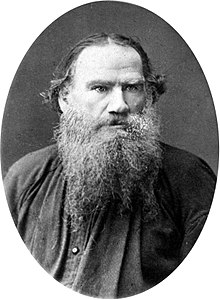The young tsar's dream
The dream of the young tsar , also The young tsar ( Russian Сон молодого царя , Son molodowo zarja ), is a story by Lev Tolstoy that was written in December 1894 and published posthumously in 1912 in LN Tolstoy's Posthumous Artistic Works , Vol. 2, Freie Ausgabe Word appeared on pages 263-274 in Berlin . In 1982 the text came out in Vol. 12 Powesti and Stories 1885-1902 of the 22-volume Tolstoy edition in the publishing house for artistic literature in Moscow .
content
Shortly before Christmas, the young tsar signed decrees raising customs duties on foreign goods, allowing spirits to be served in the market villages, punishing tramps, calling up recruits and disciplinary penalties for soldiers. Now, exhausted from the unfamiliar government work, he would like to relax - spend the party contemplatively with his young tsarina. The ruler falls asleep in anticipation of his beloved wife. Then in the dream he comes to his side and leads the young man through the kingdom .
The pictures are rapid: a Russian soldier shoots a smuggler at the Prussian border. The Russian state needs the customs income. In a village in the middle of Russia, residents die of alcohol poisoning. Closing the tavern is not permitted by law. The state earns money from drinking. In Siberia, a tramp gets the knout. The Minister of Justice's order does not allow any other punishment. A farmer, the only breadwinner, is drafted into the military, while well-to-do students, teachers and musicians buy their way out. Soldiers' wives have to keep themselves and their families alive with prostitution. A deserter is beaten to death in the punishment battalion. Women are beaten in prison. In Schliisselburg the prisoner is driven insane in the solitary cell.
The ruler awakes from the dream, dazed by the flood of images. Next door, the young tsarina is talking to an old courtier. This former employee of his father dismisses the young tsar's complaints about the burden of rulership with the remark that the people live in prosperity and those who are poor should work more. Besides, the good-for-nothing deserved no luck. The words of comfort cannot really convince the young tsar. The beautiful tsarina jumps at the old man. Governing is not easy, says the young woman. As soon as this hard work exceeds the strength of the ruler, he should transfer part of it to suitable representatives. Hm, the tsar ponders and ponders his words, i.e. those of the companion in the dream: The tsar as a person must first strive for his soul's salvation and for the establishment of the kingdom of God on earth. The narrator closes with the laconic comment: "We shall hear in fifty years which of these three paths the young tsar took."
reception
- Stein wrote in 1962 that Tolstoy wrote the story shortly after Nicholas II ascended the throne in the hopeful belief in the goodwill of the new emperor. However, the author later had to relativize the advance praise in four letters to the tsar and two letters to the tsar and his helpers .
German-language editions
- The young tsar. German by Arthur Luther . Pp. 252–264 in: Gisela Drohla (Ed.): Leo N. Tolstoj. All the stories. Sixth volume. Insel, Frankfurt am Main 1961 (2nd edition of the edition in eight volumes 1982)
- The young tsar's dream. Translated from the Russian by Hermann Asemissen . Pp. 172–185 in: Wieland Herzfelde (Ed.): Lew Tolstoi. Haji Murat and other stories. With an afterword by Günther Stein . Rütten & Loening, Berlin 1962 (1st edition, edition used)
Web links
- The text
- Wikisource Сон молодого царя (Толстой) (Russian)
- online at tolstoy-lit.ru (Russian)
- online at RVB.ru (Russian)
- Entry in the list of works of folk tales (1872–1887)
- Entry at fantlab.ru (Russian)
- Vladimir Jakowlewitsch Linkow: Commentary on the text at RVB.ru (Russian)
Individual evidence
- ↑ russ. «Посмертных художественных произведениях» Л. Н. Толстого, т. II, изд. «Свободное слово», Берлин 1912, стр. 263-274 Source: Notes (Примечания)
- ↑ Russian vol. 12 of the 22-volume Tolstoy edition 1982
- ↑ Edition used, p. 185, 2nd Zvu
- ↑ Stein in the afterword of the edition used, p. 543, 1st Zvu
- ↑ Russian В. Я. Линков
